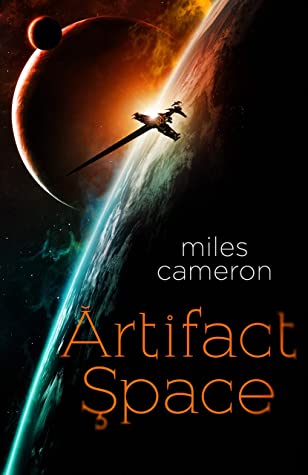
Genres: Sci Fi
Representation: Brown MC, secondary nonbinary characters, queernorm world
Published on: 24th June 2021
ISBN: 1473232600
Goodreads

Out in the darkness of space, something is targeting the Greatships.
With their vast cargo holds and a crew that could fill a city, the Greatships are the lifeblood of human-occupied space, transporting an unimaginable volume - and value - of goods from City, the greatest human orbital, all the way to Tradepoint at the other, to trade for xenoglas with an unknowable alien species.
It has always been Marca Nbaro's dream to achieve the near-impossible: escape her upbringing and venture into space.
All it took, to make her way onto the crew of the Greatship Athens was thousands of hours in simulators, dedication, and pawning or selling every scrap of her old life in order to forge a new one. But though she's made her way onboard with faked papers, leaving her old life - and scandals - behind isn't so easy.
She may have just combined all the dangers of her former life, with all the perils of the new . . .
Highlights
~the future is socialist
~mostly
~starfish aliens!
~do not mess with spaceships shaped like swords
~a military of merchants
~officers get cake; spacers get cookies
I have never been able to describe – or even pinpoint – exactly what it is that makes Cameron’s writing so unbelievably compelling, so effortlessly readable. Because he doesn’t use small words, doesn’t flinch away from getting technical, is at any moment keeping dozens of different balls in the air.
But I’ve yet to meet a book of his I haven’t passionately adored.
Which is why I took the leap and followed Cameron even when his new book was Sci Fi instead of Fantasy, and folx – I do not follow many authors across that divide. But I’m so glad I did this time, because Artifact Space blew me away. To the point that it is the only book I have read twice, cover to cover, this year.
That’s how much I loved it.
Artifact Space is set 400 or so years on from what the characters refer to as the ‘Age of Chaos’, aka the breakdown of the environment and human society on ‘Old Terra’. Humans have spread across space, terraforming some planets, colonising others, building habitats that aren’t attached to a planet at all. In the process, they came across the aliens humans call the Starfish, with whom almost no communication is possible, but upon whom basically the entire interstellar human economy depends. The Starfish are the creators of xenoglas, a material that goes in everything from body armour to spaceships to handheld technology – at this point, if the supply were cut off, a big chunk of human space would collapse.
But it’s fine, because humans have the Greatships – absolutely enormous spaceships shaped like swords and capable of ‘jumping’ through space, effectively teleporting between galaxies. For centuries, the Greatships have gone round and round the trade route between human space and the Starfish, regular as clockwork. No Greatship has ever been captured, lost, or destroyed.
Marca Nbaro has been raised in the Orphanage, a horrific institution where she saw friends sold into slavery and had to fight to stay alive. When the book opens, she’s making her way onto the Greatship Athens – with forged credentials. Her training and skills are the real deal, but the head of the Orphanage had her blocked from entering the Service – the merchant-and-sorta-military branch of the DHC, the consortium that runs (not rules) a big chunk of human space – so to make it, she had to fake it. Once on the Athens, she’s far outside her old enemy’s reach, finally living her dream.
But of course, things don’t stay that simple.
Artifact Space is a book that you can just sink into – and it’s surprisingly feel-good. Nbaro, as she’s referred to most of the time, is a main character I clicked with immediately, and the changes she goes through over the course of the book were believable, interesting, and handled really well. In the opening pages, she’s ruthless and closed-off and trusts no one, traits that are the pretty natural result of her fucked-up childhood; but over the course of the book, her defences start to come down, bit by bit, as it’s made clear to her that she no longer needs them – not like she once did. The fulfilment she finds in the Service, as well as the awe and love she feels for the Athens, are wonderful and endearing; she’s not at all perfect, but I loved her and can’t wait to see more of her in the sequel!
The cast of secondary characters is massively impressive, with each and every one feeling fully fleshed-out and real, from Morrosini, the AI of the Greatship Athens, to Drake, Nbaro’s roommate and eventual best friend, and Dorcas, whose position on the Athens is mysterious, and the power he wields – despite not being Service – even more so. Those three were my favourites, but there’s at least a dozen others to admire, ranging from Nbaro’s commanding officers to the Marines she has reason to work with.
And of course, there’s the worldbuilding. Cameron introduces us to numerous planets and habitats that are part of Human Space, all of which are different, most of which were settled by a particular segment of humanity; one planet was colonized by Muslims, for example, and there’s a frontier planet (on the edge of Human Space) called Texas, which made me laugh. It means each place the Athens visits has its own culture, each place distinct from the next, which I really appreciated. Since Nbaro only gets small glimpses of each world, so do we, but I think Cameron gives us just enough of a look at each place to get a feel for it, to recognise its uniqueness, before the Greatship and Nbaro move on. It’s a good balance. To say nothing of the culture of the Service, and by extension the DHC, which is mostly socialist and egalitarian – except for the ways in which it’s not.
What about the story, then? A lot of the book is concerned with Nbaro’s day-to-day life as a midshipper, learning and performing her duties, making connections with her fellow Service members, figuring out the culture and traditions of the Athens and how a Greatship is run. I’m sure that could make for very boring reading in the hands of another author; in Artifact Space, it just has this bizarrely feel-good vibe I mentioned earlier. It’s oddly relaxing and pleasurable to read about fuel flights and Tactics classes, and I can’t put my finger on why. It’s a quirk of Cameron’s writing style that I’ve found in all of his books so far; somehow he can write about what should be dull minutiae, and make it, not exciting exactly, but warm and moreish. And then there’s the character development, and the relationships Nbaro forms; those are all plot too.
But that’s not to say there isn’t a much more dramatic, flashier storyline weaving through all the quieter ones! Firstly, there’s the head of the Orphanage, who is absolutely not done with Nbaro, and has no intention of letting her escape his grasp. Second, and much more importantly…someone is out to destroy the Athens. Lab-born plagues, suicide pills, hacking attempts and nukes are only a handful of what the enemy throws at Nbaro and her ship – and no one even knows who the enemy is.
Like Cameron’s latest Fantasy series – the Masters & Mages trilogy, which I strongly recommend as well – classism and privilege and socialism are all big themes, but so is overcoming the harsh training of a terrible childhood, learning to emote and recognise that most people are basically decent – and quite a lot of them are really, really good. I think that’s where a lot of the feel-good vibes come from: Nbaro’s gradual realisation that most people are not evil and/or out to get you. It’s an intrinsically heart-warming character arc.
Basically, it’s totally awesome, one of my favourite books of the year, and I can’t recommend it enough!






Leave a Reply